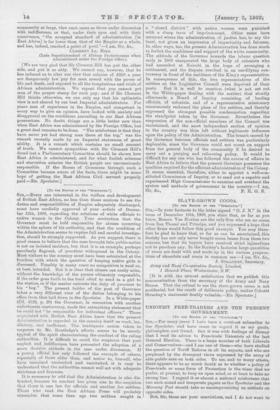[TO TIM ED/T010 OV THE " SPBOTATOR.".1
Sin,—Eveiy one interested in the welfare and development of British East Africa, no less than those anxious to see the duties and responsibilities of Empire adequately discharged, must have cordially approved of your. article of Decem- ber 12th, 1908, regarding the relations of white officials to native women in the Colony. Your contention that the Governor must be held responsible for abuses occurring within the sphere of his authority, and that the condition of the Administration seems to require full and careful investiga- tion, should be strongly supported. As you suggest, there is good reason to believe that the case brought into public notice is not an isolated incident, but that it is an example, perhaps peculiarly flagrant, of practices widespread in the Colony. Most visitors to the country must have been astonished at the freedom with which the question of keeping native girls is discussed. Possibly in many cases no compulsion is used or, at beet, intended. But it is clear that abuses can easily arise, without the knowledge of the person ultimately responsible, if the order goes forth to the local chief to send in a girl to the station, or if the master entrusts the duty of procurer to his "boy." The present bolder of the post of Governor takes a very different view of the duties belonging to his office from that laid down in the Spectator. In a White-paper (Cd. 4122, p. 20) the Governor, in connexion with another unfortunate controversy, made the astonishing statement that he could not "be responsible for individual officers." Those ;loin:lint-Rd with British East Africa know that the present Administration is regarded in the country itself as weak, lax, dilatory, and inefficient. The inadequate action taken in response to Mr. Rontledge's efforts seems to be merely typical of the spirit characterising the conduct of the ruling authorities. It is difficult to avoid the suspicion that past neglect and indifference have prevented the adoption of a more decisive attitude in the case under discussion. If a young official has only followed the example of others, especially of those older than, and senior to, himself, who J1'6 remained unchecked and unrebuked, it ia easy to understand that the authorities cannot well act with adequate strictness and firmness.
It is necessary to add that the Administration is also dis- trusted, because its conduct has given rise to the suspicion that there is one law for officials and another for settlers. Those who read the Bast African Press will probably remember that some time ago two settlers caught in
"closed district" with native women were punished with a sharp term of imprisonment. Other cases have occurred where the administration of justice has, to say the least, not given an impression of impartiality and fairness. In other ways, too, the present Administration has done much to forfeit the confidence and support of the white community. The attitude of the Governor towards the labour question early in 1908 exasperated the large body of colonists who bad assembed at Nairobi in the hope of arranging a settlement, and the dispute resulted in an unedifying con- troversy in front of the residence of the King's representative. In consequence of this, the two representatives of the settlers on the Legislative Council were deprived of their posts. But it is well to mention (what is not set out in the White-paper dealing with the matter) that shortly afterwards a Board of Inquiry consisting of leading officials, of colonists, and of a representative missionary unanimously endorsed the pleas of the settlers, and thereby expressed the strongest possible condemnation regarding the standpoint taken by the Governor. Nevertheless the suspension of the non-official members of the Council was maintained, and the most independent section of opinion in the country was thus left without legitimate influence upon the policy of the Administration. The breach caused by the Governor between officials and settlers was particularly deplorable, since the Governor could not count on support from the general body of the community if he desired to• carry out a purging and reforming policy. It would be difficult for any one who has followed the course of affairs in East Africa to believe that the present Governor possesses the qualities required for the efficient administration of the Colony. It seems essential, therefore, either to appoint a well-con- stituted Commission of Inquiry, or to send out a capable and experienced High Commissioner to examine and overhaul the system and methods of government in the country.-1 am,












































 Previous page
Previous page